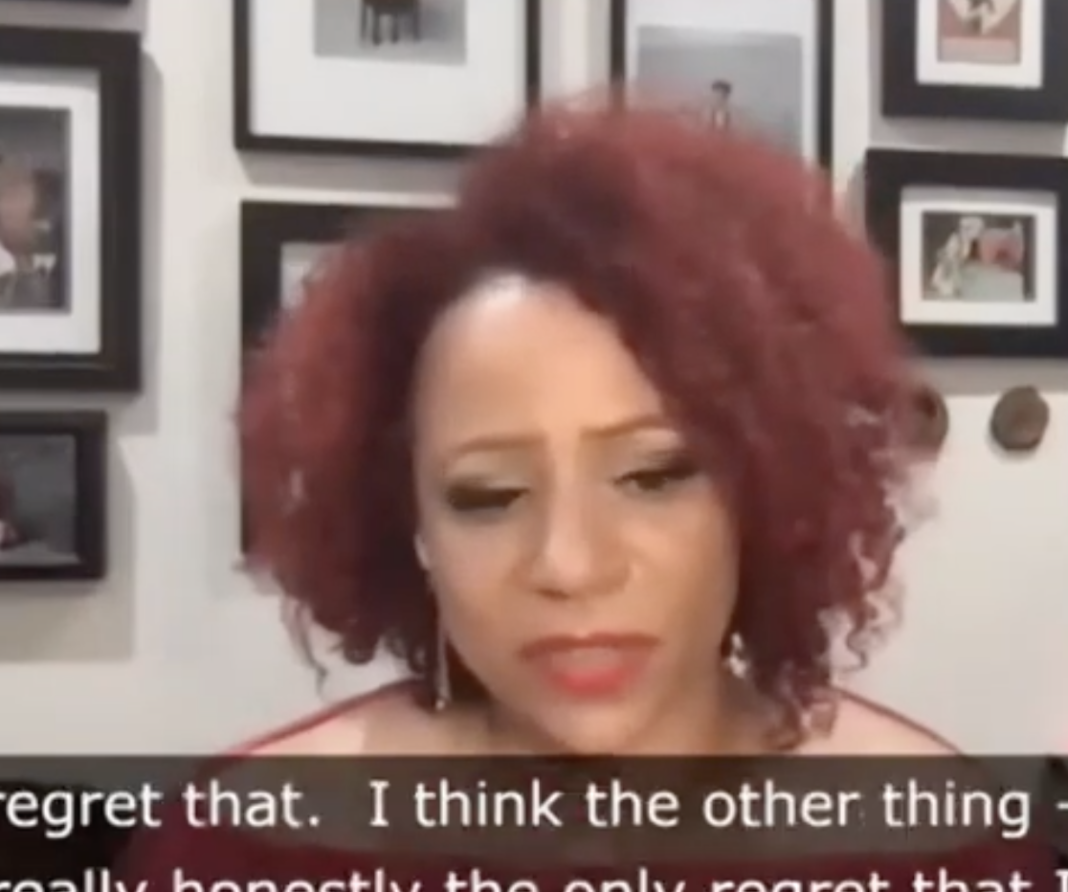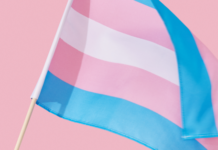Back in April, Nikole Hannah-Jones joined the Harkin Institute at Drake University for a conversation about the 1619 Project she created, which contains a number of factual errors about how America was founded.
Jones said she became a journalist to write about black people.
“The only reason I ever wanted to be a journalist was to write about black people particularly and racial inequality,” she said. “That’s why I started writing for my high school newspaper. I joined the newspaper because I would look in the newspaper and there were never stories about the kids like me — the black kids who were being bussed out of our neighborhoods into someone else’s neighborhood to go to school.”
She said she’s always wanted to get to the “why, the how and the who is responsible” for “racial inequality” and the sufferings of black people in America.
Americans believe the past is important only in ways they want it to be important, she said.
“We clearly believe the Declaration of Independence is important. We clearly think that the Constitution still shapes our society, that our founding ideas still shape our society,” Jones said. “But when it comes to slavery and its legacy, we really want to pretend that at emancipation, slavery no longer had an impact on our country. And my work has really been about trying to show that history matters. That history clearly impacts our society whether we acknowledge that history or not. And we can’t understand any of these institutions in our society without grappling with the legacy of racial inequality but also the decisions that people and institutions make right now.”
Jones doubled down on her assertion that securing slavery was part of the reason the American Revolution was fought. She noted that many founders were enslavers, as well as “the person” who wrote the Declaration and “the person” who wrote the Constitution and “the person” who wrote the Bill of Rights. Jones also mentioned 10 of America’s first 12 presidents were “enslavers.”
But even knowing all of that, she said she never made the connection that slavery could have been a motivating factor in why some colonists decided to join the revolution. At that point, she realized most have never been taught to challenge America’s “founding myth.”
Jones said that black people have been the most democratizing and ardent believers in America’s founding ideals.
Criticisms of the project have been coordinated, she said, with the right-wing and politicians.
“This fight is about power,” she said. “It’s never been about historical accuracy. History as we commonly understand it has never been about this is what happened on this date and this is who did it. It’s been about a selection of facts to create a common understanding that often is geared toward affirming this idea of American exceptionalism. And that’s about power. My 1619 Project challenged the power of who gets to determine our national narrative. Who gets to decide how we think about our country. And so I had to be taken down a notch for kind of having the audacity to do that in an institution like The New York Times.”
Jones said there are some “really hard days” and days where you feel alone, but she’s also felt a deep sense of pride that the ideas put forth in the project could be “so frightening” to powerful people that they would feel the need to attack it.
“That legislature in my own state would try to prohibit the teaching of a work of journalism,” she said. “The 1619 Project has been mentioned in both of Donald Trump’s impeachment trials…it speaks to the power battle that our larger society is going over, which is who are the real Americans, whose stories matter, who are legitimate heirs to this country and its ideals and I’m actually very proud that I’m unsettling so many powerful people’s understanding and the power that they’ve had over that.”
Jennifer Harvey, the Drake professor who moderated the discussion, thanked Jones for “unsettling” everyone.
“I’m very sorry that you’ve been through that,” she said. “I’m really glad we ended that bill here in Iowa, so thank you for being willing to unsettle us collectively.”
Jones then disparaged Iowa, and again, was factually inaccurate in some of her claims like Iowa being the first state to legalize homosexual marriage.
“Many of us have been very disheartened with some of the turns that the state has made,” she said. “It used to be a very moderate state. It was the first state to legalize gay marriage. It was the first state to prohibit school segregation through the state Supreme Court. I got some of the best public education and best-funded public education in the country and so much of what many of us identified as Iowa core values have been under attack. But to see Iowans really rise up against a bill like this and squash it gave me just the tiniest, tiniest gleam of hope that maybe, maybe we can see the state going back to what I consider to be its center.”
Jones said she is not a “hopeful” person due to her studies of the history and experiences of black Americans.
“I don’t think America will ever make right what it’s done,” she said. “But I know for a fact, it will never make right if we don’t acknowledge what’s been done. And that that acknowledgment, that owning up is the first step for any type of repair.”
America, she said, wants “peace without justice.” And to ignore the “bad stuff” that is shaping the present.
“We don’t have to talk about slavery, we don’t have to talk about the 100 years of racial terrorism and apartheid that followed,” she said. “We don’t have to talk about all of the discrimination that followed the end of legal discrimination. But whether we talk about it or not, we can look across our society and see its impact that black people and native people are at the bottom of everything we can measure…and these are the two groups of people who did not choose to be a part of the United States.”
Jones said people do not have to feel ashamed for things they did not do, but they should acknowledge they have inherited things whether or not they did them.
“And what we have to own is what we do with what we have inherited,” she said. “It’s not just about the past, it’s really about the present and saying all of these areas of modern American life have been shaped by slavery, which to me leads to the ultimate question of then, if we acknowledge that so much of our society was built on slavery and that so much of the conditions black Americans live in can be traced to the legacy of slavery, what must we do?”
Jones said she advocates for reparations.
“Black people suffer the most,” she said. “But our society as a whole suffers from our inability to grapple with and move forward from a legacy of slavery. We have the most unequal society of the Western democracies. We have the highest rate of poverty of the Western democracies. We’re the only one of the Western industrialized countries that doesn’t have universal health care…because we can’t get over the legacy of slavery. We have the stingiest social safety net. We have the lowest livable wage. These are all legacies of slavery and we would all be a freer, healthier, wealthier society if we could address those legacies.”
Jones said the “insurrection” of Jan. 6 is a legacy of slavery — the belief that “only certain people are real citizens” or “legitimate voters.”
“That a white minority should be able to rule this country,” she said.
She continued to attack the founding of the country, saying America was not founded as a Democratic society and that most people couldn’t vote when the country was founded.
“The Electoral College comes out of the belief that you can’t trust citizens to determine elections, you need a college of elites who will ultimately decide who wins the presidency,” she said. “That all comes out — the idea of Republicanism — comes out of Virginia because they understood that white elite would actually be the ones who were enfranchised because the majority of the poor population in Virginia were enslaved people who could never vote.”
White Americans’, she said, belief in democracy declines if they think people of color are gaining a majority.
“Large numbers of white Americans don’t actually believe in democracy,” she said. “They don’t think that a multi-racial group of people should elect our governance, they believe that this is a country where white people should determine who is elected into the highest office. That’s where you get the insurrection.”
She said “black people saved democracy” in the 2020 election.
In contrast, white people who are not rich continue to vote against their interests.
“It’s failing to understand that whiteness is their interest and whiteness is more valuable in some ways than money in a society based on white supremacy,” she said. “That’s why understanding this history is so important.”
Sometimes she gets annoyed when people ask how Americans can undo the racist society.
“You didn’t ask us that when you created it,” she said. “No one consulted black people on how do we create slavery, how do we create segregation. So, if you could figure out how to create it, you can figure out how to undo it and you don’t have to actually task us with telling you what you kind of can figure out on your own. And then, of course, we’ll tell you and you won’t really do it anyway.”
As for Iowa, Jones said she knew in high school she was “getting the hell out of Iowa” as soon as she graduated.
“Iowa has a lot going for it, but not right now,” she said. “It’s become a rather far-right state in some ways.”
She said it will not attract people of color or young people to the state considering who it is sending to Congress.
“It’s also just a very white state,” she said. “And, that becomes a chicken and the egg — how do you get people to go to a state when they want to be in diverse communities?”
She said people of color do not want to go to a “white state.”
“There’s so much inequality, there’s not the proper support,” she said. “They don’t want to stay. Iowans are generally nice on the outside, but Waterloo was named the worst place in America to be black. You don’t get that by accident. That niceness is really a veneer for communities that are actually quite intolerant and quite accepting of inequality. I would never want to move back, frankly.”
















